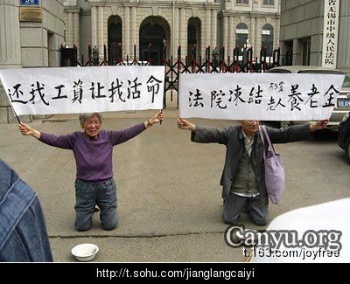“Kneeling country”的版本间的差异
来自China Digital Space
| 第1行: | 第1行: | ||
跪国 (guì guó) kneeling country | 跪国 (guì guó) kneeling country | ||
[[File:kneeling.jpg|350px|thumb|right|''Two people kneel in front of a courthouse holding signs that read, “Return my wages, allow me to live,” and, “The court has frozen the retirement funds of an 83 year old elderly person.”'']] | [[File:kneeling.jpg|350px|thumb|right|''Two people kneel in front of a courthouse holding signs that read, “Return my wages, allow me to live,” and, “The court has frozen the retirement funds of an 83 year old elderly person.”'']] | ||
| − | |||
| − | + | A mockery term to describe a country where citizens feel compelled to kneel in order to get what they should be entitled to. Homophone to the term 贵国(guì guó), meaning “distinguished country” often used on diplomatic occasions. | |
| + | |||
| + | Kneeling in front of a government building or government official is a way for petitioners to attract public attention and get their grievances heard. | ||
| + | |||
| + | Examples: | ||
| + | |||
| + | <blockquote> Guchengyike (孤城异客): A ''qilu'' poem --- Culture of the '''Kneeling Country''': Forget about that a real man doesn't kneel easily, this divine land is always full of disabled men. Servile people kowtow at the red steps of the palace, ignorant masses kiss the ground at the government buildings. People kowtow to salute the emperor and cultivate themselves to be shitizens. A man shamelessly proclaims that Chinese people have stood up, we should all know it's merely a self consoling fantasy. </blockquote> | ||
| + | |||
| + | <blockquote> 七律 跪国文化 休说膝下有黄金,自古神州薮废人。 奴到丹墀头抢地,氓出衙署嘴蒙尘。 撅臀三尺朝天子,稽首千年做屁民。 不惭豪言称站起,当知自慰带意淫。 [[http://blog.sina.com.cn/s/blog_5d6a21dd0100ms22.html '''Chinese''']]</blockquote> | ||
[[Category: Grass-Mud Horse Lexicon]] | [[Category: Grass-Mud Horse Lexicon]] | ||
2015年5月30日 (六) 00:14的版本
跪国 (guì guó) kneeling country
A mockery term to describe a country where citizens feel compelled to kneel in order to get what they should be entitled to. Homophone to the term 贵国(guì guó), meaning “distinguished country” often used on diplomatic occasions.
Kneeling in front of a government building or government official is a way for petitioners to attract public attention and get their grievances heard.
Examples:
Guchengyike (孤城异客): A qilu poem --- Culture of the Kneeling Country: Forget about that a real man doesn't kneel easily, this divine land is always full of disabled men. Servile people kowtow at the red steps of the palace, ignorant masses kiss the ground at the government buildings. People kowtow to salute the emperor and cultivate themselves to be shitizens. A man shamelessly proclaims that Chinese people have stood up, we should all know it's merely a self consoling fantasy.
七律 跪国文化 休说膝下有黄金,自古神州薮废人。 奴到丹墀头抢地,氓出衙署嘴蒙尘。 撅臀三尺朝天子,稽首千年做屁民。 不惭豪言称站起,当知自慰带意淫。 [Chinese]





